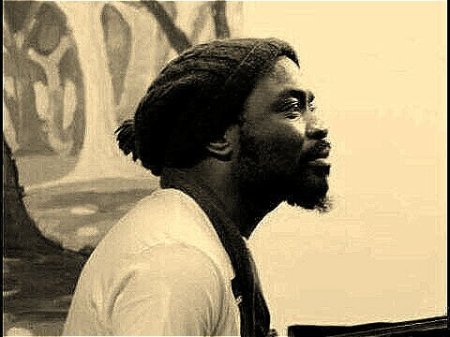We are hosting a beautiful conference this week at UPenn called “Diasporic Circuits Reconsidered.” If you catch this post today and are in the Philadelphia area, come on through! Find more info and today’s schedule
here.
Last night at the Painted Bride in conjunction with the conference we hosted an amazing night of diasporic grooves…from South Africa, the sublime Nduduzo Makhathini (pictured above), from Jamaica (and Brooklyn) the Nyabinghi chants of Ancient Vibrations as well as Junior Wedderburn’s UZALO, and last but not least a deeply tender set of duets between Penn’s own Professor Guthrie Ramsey and his stunning vocalist daughter, Bridget Ramsey. I had the honor of hosting the event and providing some opening remarks, included below…
—–
I first give thanks to and for this space, this generous, generative and welcoming space the Painted Bride, which I knew about long before I ever moved to Philadelphia because of the important relationship so many of my writing mentors had to this space…people like Ntozake Shange, Sekou Sundiata, and Toni Cade Bambara. Tonight, we also give thanks to our musical ancestors Max Roach, Abbey Lincoln, Oscar Brown Jr, and Babatunde Olatunji as we respectfully riff and reflect on their pan African masterpiece, “We Insist!: The Freedom Now Suite” recorded in 1960. We decided to call tonight’s gathering of music and visual art from South Africa, Jamaica and Philadelphia: The Diaspora Now Suite as homage to the diasporic circuits considered then by Max Roach and company….
From crushing cotton field stomps
To baleful Johannesburg cries,
“Ain’t but two things on my mind…driva man and quittin’ time…”
Those percussive prayers and unholy screams served then and still serve now as down beat to our antiphonal emancipation meditations, our atlantic-wide ring shout.
When I say whisper, you say listen,
whisper
listen
whisper
listen….
listen say we’re free.
Say we’re free?…CAN IT REALLY BE? is it freedom day?
We gather this week, 20 years almost to the day of the election of Nelson Mandela, and wonder from the Western Cape to Coral Gardens to Old city Philadelphia, when is freedom day? And in our blues we feel at times like Abbey Lincoln, worried and wondering, are these just rumors flying, must be lying because the broken promises, broken bodies, broken hearts in our paths post apartheid, post colonial struggles, post civil rights, post 9/11 do not ring in the key of life, do not sound the bells of liberty.
It is holy week for our Christian brothers and sisters, holy (Maundy) Thursday to be specific, so brokenness is a theme in the meditations of many across the globe tonight. One of my favorite lines on brokenness comes from the Sufi teacher Hazrat Inyat Khan who tells us, god breaks the heart over and over and over until it stays open.
Until it stays open…
As engaged thinkers and seekers, activists and teachers we stay open to the kinds of conversations we are having this week at Penn in our
Diasporic Circuits Reconsidered conference. And while most of us still insist on FREEDOM NOW, this week we do the work to collectively whisper and listen across oceans, across differences of region, race, gender, discipline, color, class, spiritual and secular practices, asking the question, not freedom now but freedom
how?Tonight the extraordinary musicians gathered here, Ancient Vibrations, Guthrie and Bridget Ramsey, Nduduzo Makhatini and Uzalo, get to do a different part of this work with us. And here I want to wind down with some lines from Robin D.G Kelley’s recent book,
Africa Speaks, America Answers…lines in praise of the power of jazz and other black musics of the diaspora to energize our minds and souls for this challenging work ahead. Kelley writes:
In short, the musical and political dialogue between Africa and America continues, and jazz–along with hip hop, reggae,
afrobeat, makossa, rai, zouk and countless styles and genres remains a vibrant language. But like everything else, the conversation has changed and will change again. The essential qualities of the music have not. Jazz knows no borders or boundaries, it is a music of lamentation and hope, pain and exhiliration, crisis and resistance, and above all…FREEDOM, UHURU! Jazz speaks and will continue to speak from every continent, every city, every culture around the globe. And before we answer, let us listen–listen to the music and listen for the music…wherever it might be. It will not solve global economic crises or end conflicts, but it can do what it has always done–
FREE OUR IMAGINATIONS
ANIMATE THE MARVELOUS
ACTIVATE OUR SPIRIT
AND ILLUMINATE AN IMPROVISED PATH WE’VE NEVER HEARD OR SEEN BEFORE…
Thank you so much for coming out, hope to see you tomorrow at Penn. And now let the marvelous begin….
